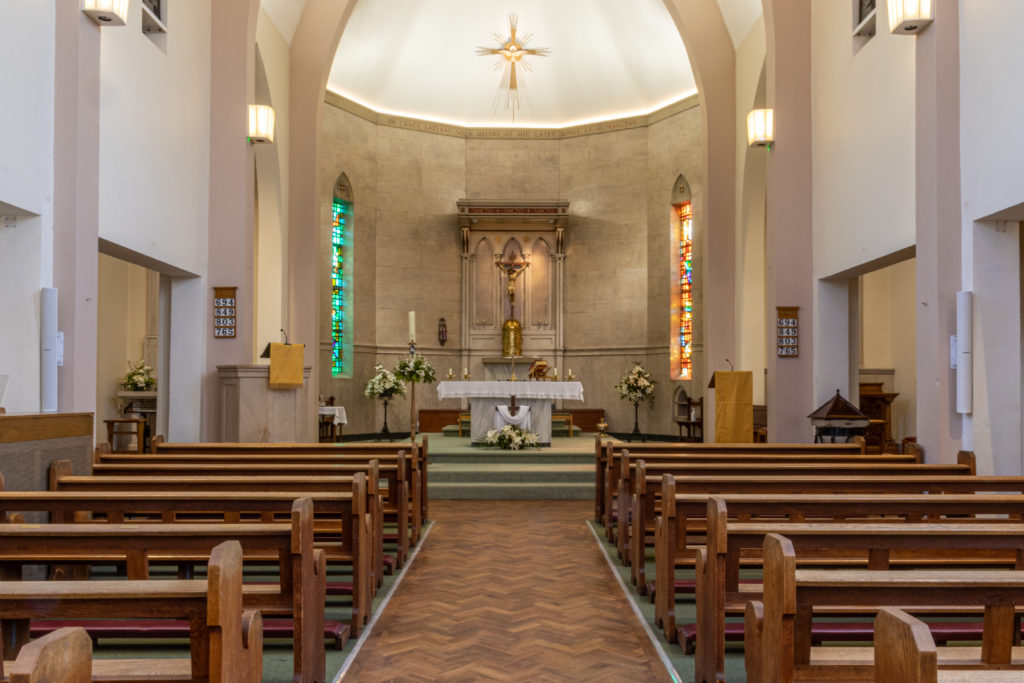Mass is celebrated every day, but the high point of the week is when the family of the church gathers for Mass on the Lord’s Day, that is Sunday, the day of the resurrection. The Mass is described as the ‘source and summit’ of our lives as Catholic people: ‘summit’ because it is the greatest expression of our love and gratitude towards God, and ‘source’ because everything else we do flows from our meeting with the Lord. Our Lord is present to us in various ways, but most of all in the bread and wine which truly become his body and blood, given to us as food for eternal life. This is called ‘Holy Communion’.
Pope Francis has reminded us that Holy Communion is medicine for sinners, not a ‘prize for the perfect’. As an expression of our unity as members of Christ’s body, however, only those who belong to the Catholic Church and are suitably prepared may received Holy Communion. Part of this preparation involves examining our lives and conscience in the light of Church teaching and the help of the Holy Spirit, and going to confession if we are aware of anything significant that gets in the way of receiving all that God wishes to give us.
Non-Catholics, and any Catholic person who is not able to receive Holy Communion, are invited to make an act of spiritual communion, asking the Lord to fill our hearts with all that he wants to give us, and then to come forward to receive a blessing. The traditional way of indicating this is to place your arms across your chest as you approach the minister.

Holy Communion is offered in two ‘kinds’ – the ‘host’ (consecrated bread) and the chalice (consecrated wine). We shouldn’t speak of ‘bread’ and ‘wine’ because we believe they are changed into the body and blood of our risen and living Saviour. Our faith teaches us that the body and blood of Christ are inseparable – even if we receive only one ‘kind’ as was the practice for many years, we receive the full body blood, soul and divinity of Jesus Christ and all the spiritual benefits he wants to give us.
Sometimes only one kind is offered to the congregation, but if both kinds are offered it is an entirely free choice whether to receive both or just one (usually the host). The bread and wine that are offered and consecrated at Mass are made from the purest and simplest ingredients of flour, water, and the fermented juice of grapes. If you have a serious gluten intolerance, such that you cannot safely consume a host (wafer), it is possible to use hosts that have virtually all of the gluten removed – please speak to the priest before Mass if this is something you require for health reasons.
Receiving Holy Communion for the very first time is a significant moment in the life of a young Catholic. Typically this takes places around the age of 8 when that young person is able to distinguish between Holy Communion and ordinary food. Before this happens they will have been prepared by our Catechists to appreciate this gift and God’s love for them. The First Holy Communion celebrations normally take place in May or June. Children will attend a series of classes which start the previous autumn and will be advertised in the newsletter. The classes are open to anyone belonging to our parish (i.e. living within the parish and/or regularly attending Mass here) who is in year 3 or above, and a programme is given out at the first meeting. Parents are expected to be fully supportive, prioritising the First Holy Communion programme above other activities for that year and also ensuring they model good practice and establish good habits by coming to Mass every week and praying as a family. There will also be some sessions led by the parish priest for the parents to help them in their vocation as Christian parents and to renew their own appreciation of the Eucharist.
Registration is now closed for our 2025-2026 First Holy Communion Programme.
Registration for the following year will open in September 2026.
Find out the various events and news from the church, parish and wider community.
© 2025 St Josephs Catholic Church | Privacy Policy | Safeguarding